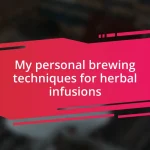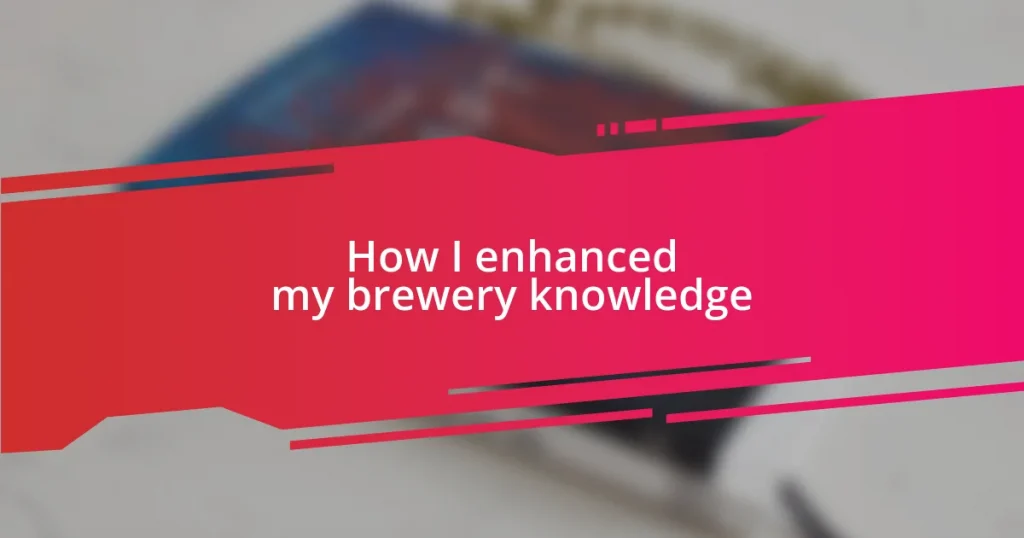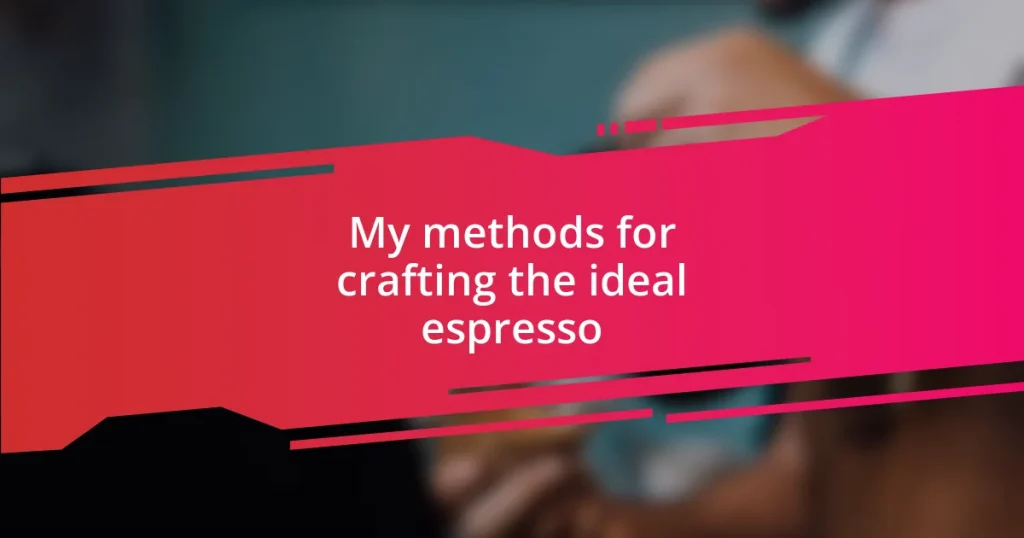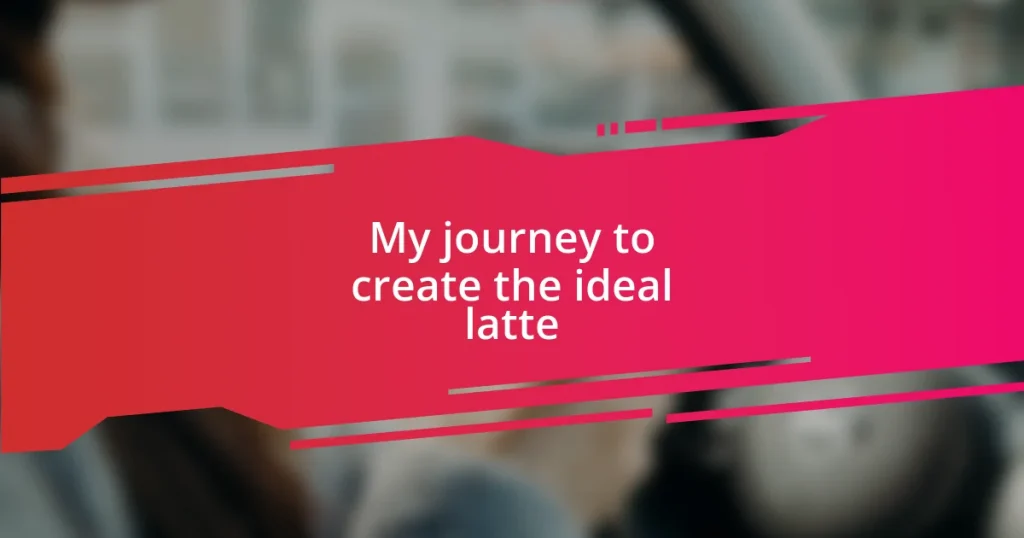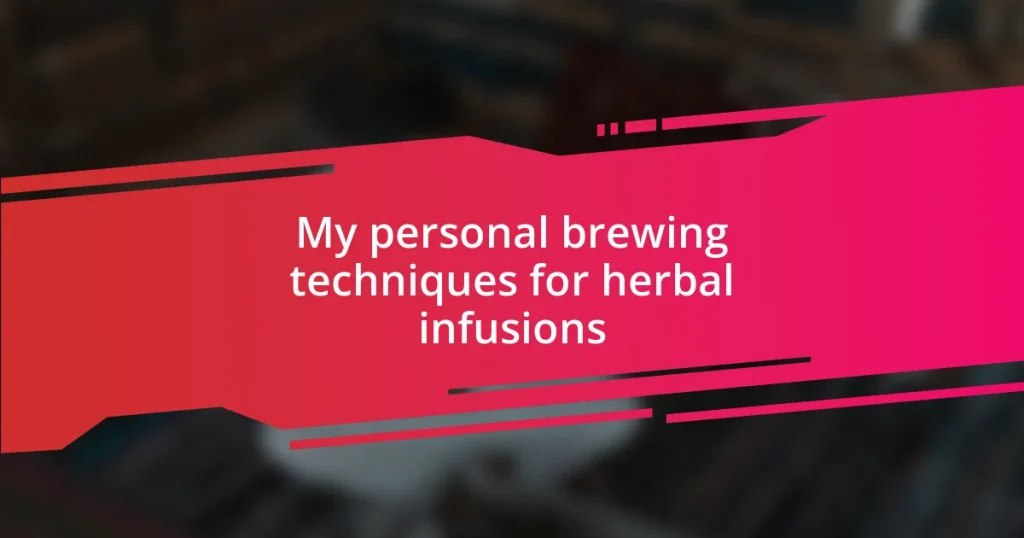Key takeaways:
- Realizing the importance of sanitation and the impact of each brewing detail transformed the author’s brewing journey.
- Hands-on experiences in community brewing and collaboration with seasoned brewers enhanced practical skills and resilience under pressure.
- Engaging with industry experts and staying updated on brewing trends significantly enriched the author’s knowledge and inspired innovation in brewing techniques.
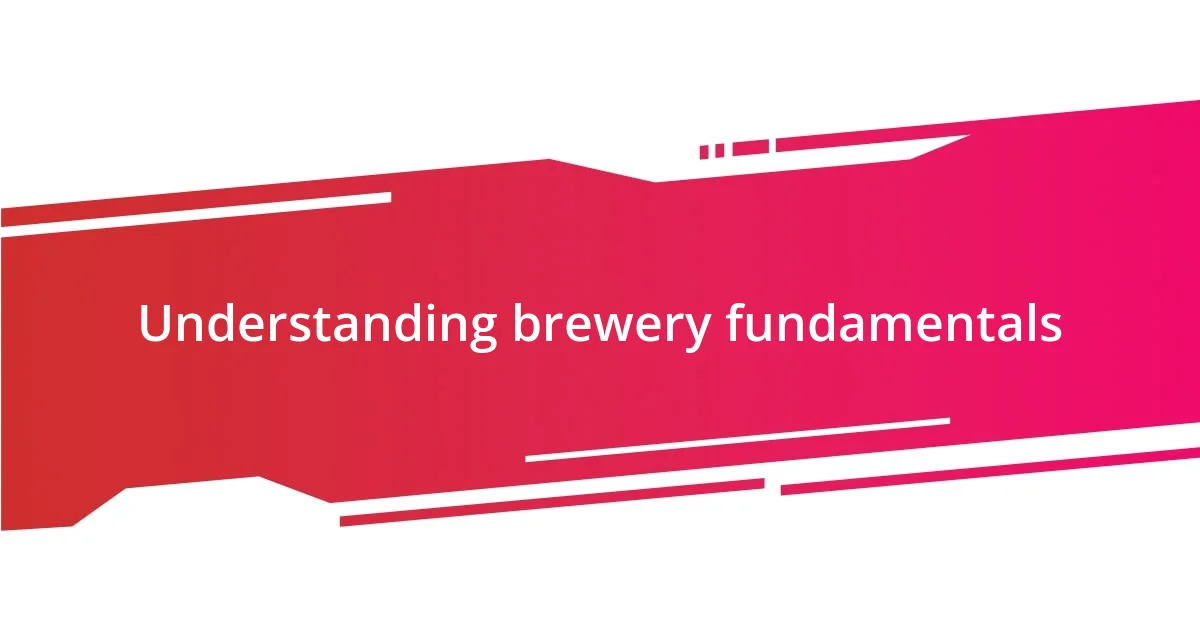
Understanding brewery fundamentals
Understanding the fundamentals of brewing is like learning the language of a craft; each step contributes to the final flavor profile. I remember my first home brew – I was so focused on the recipe that I overlooked the importance of sanitation. It’s a simple step, yet skipping it can lead to unexpected results, and that’s where my brewing journey really began—realizing that every detail matters.
Malt, hops, yeast, and water are the cornerstone ingredients, but what do they each bring to the table? I learned that malt not only adds sweetness but also contributes to the color and body of the beer. That moment when I tasted my first amber ale made with a rich malt base was an eye-opener for me—it was like I had unlocked a secret. Can you remember the first time you really savored a complex flavor in beer? That’s understanding the essence of brewing.
As I dove deeper, the science behind fermentation fascinated me. The way yeast transforms sugar into alcohol and carbon dioxide is nothing short of magical. I still find myself in awe of how slight temperature changes can affect the final product. Have you ever thought about how much a little tweak in brewing techniques can elevate your beer experience? It certainly made me appreciate the artistry behind each pint I enjoyed!
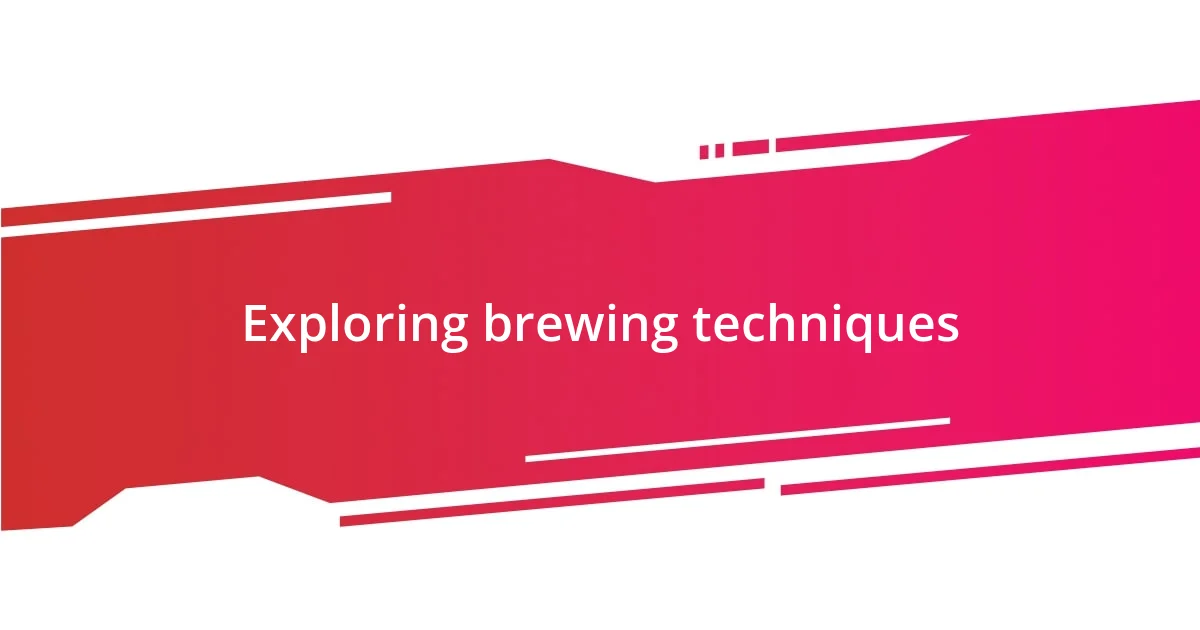
Exploring brewing techniques
Exploring brewing techniques can truly be a game changer for any aspiring brewer. One evening, I decided to experiment with dry hopping—a technique I had read about but never tried. Watching those aromatic hops floating in the fermenter felt almost enchanting. When I finally tasted the resulting IPA, the burst of citrusy flavors was exhilarating! It was a reminder that even the smallest adjustments in technique can lead to extraordinary results.
Here are some key brewing techniques that can enhance your process:
-
Mashing: Allows enzymatic processes to convert starches into fermentable sugars. I once spent a Saturday mashing different grains, and learning how temperature and time influenced flavor was a revelation.
-
Boiling: Essential for extracting bitterness from hops. I recall my first batch where I didn’t boil long enough, resulting in a surprisingly sweet beer—it was a bit of a disaster, but a fantastic learning experience!
-
Fermentation control: Maintaining optimal temperatures during fermentation directly affects the yeast’s performance. I purchased a simple fermentation chamber that transformed my brewing results drastically; my beers have never tasted better!
-
Conditioning: This step clarifies your brew and develops flavor complexity. I remember my impatience waiting for a barrel-aged stout to condition—it felt like an eternity, but the rich, layered flavors that emerged made it all worthwhile.
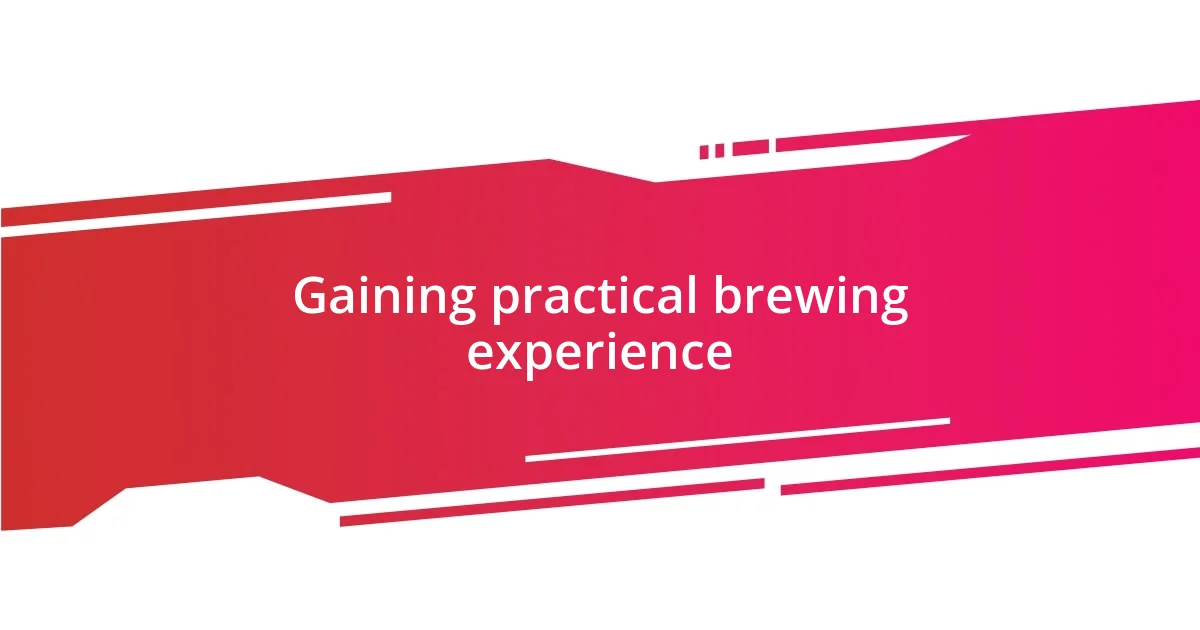
Gaining practical brewing experience
Gaining practical brewing experience has been one of the most rewarding aspects of my brewing journey. When I set out to brew my first batch in a community brewery, I felt an electric mix of excitement and nerves. Working alongside seasoned brewers, I learned the importance of collaboration in the brewing process. I remember how we tackled an unexpected equipment failure together, and that moment taught me that hands-on experience is invaluable. There’s something about the chaos of brewing that makes every ounce of effort worthwhile.
During one of my brewing sessions, I found myself under the pressure of an impending competition deadline. As the clock ticked down, I realized how crucial it is to stay adaptable and resilient. Rather than panic, I focused on fine-tuning my recipe, and to my surprise, the very experience taught me about the art of improvisation. That batch didn’t just compete; it earned me my first award. It was a pivotal moment that reinforced my belief in the significance of practical experience.
You learn to trust your instincts through actual brewing. I can vividly recall a day spent experimenting with various water profiles. By adjusting the mineral balance in my water, I transformed a lackluster pale ale into something remarkable. Each taste was a revelation, underscoring the delicate interplay between ingredients and technique. Have you ever found that moment when your intuition guides your brewing decisions? That realization made me appreciate how much personal experience shapes my brewing identity.
| Practical Brewing Experience | Key Insights |
|---|---|
| Community Brewing | Working with experienced brewers taught me collaboration is key. |
| Competition Day | Staying adaptable under pressure can lead to unexpected rewards. |
| Water Profiling | Tweaking water chemistry can drastically improve beer flavor. |
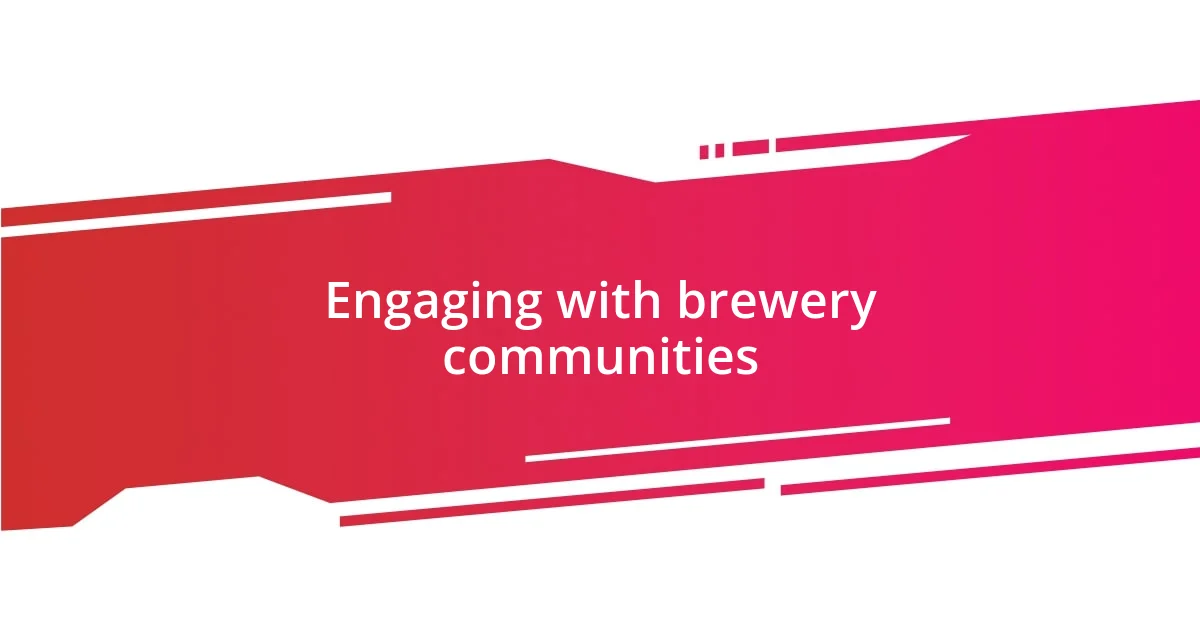
Engaging with brewery communities
Engaging with brewery communities has been a transformative experience for me. When I first joined a local homebrewing group, I was a bit hesitant, unsure of how I’d be received. However, the warmth from fellow members quickly dispelled my nerves; sharing stories over a freshly poured pint made me feel right at home. Isn’t it amazing how a simple love for brewing can unite people from all walks of life?
I also took part in several beer festivals, which were eye-opening. One time, I connected with a brewer whose family had been in the craft beer scene for generations. Listening to their journey—filled with failures, triumphs, and even some heartbreak—reignited my passion for brewing. It made me ponder: how many untold stories are hidden behind every craft beer label? Every conversation enriched my understanding and sparked new ideas for my craft.
Collaborating with other brewers during community events offered invaluable insights. I recall a workshop where everyone brought a different beer to share and critique. As we spoke about the aroma or the mouthfeel, I realized how each perspective added depth to my brewing knowledge. Can’t we all agree that feedback—especially from those with shared passions—can be the greatest teacher? Engaging with these communities propelled my brewing skills forward, and the friendships I’ve made along the way are just as rewarding.

Learning from industry experts
Learning from industry experts has dramatically expanded my brewing knowledge. I remember when I attended a seminar hosted by a renowned brewer who shared insights on yeast management. Listening to him describe his experiments with different yeast strains felt like unlocking a treasure chest of information. Have you ever had that moment when a single conversation challenged everything you thought you knew? It certainly did for me, and I left feeling invigorated to experiment in my own brewery.
A turning point came during a tasting panel where a panel of seasoned brewers evaluated various craft beers. Their passionate discussions illuminated aspects of flavor balancing and aromatics that I had previously overlooked. I felt a mix of gratitude and awe, absorbing their knowledge as if it were a fine brew. Seeing their passion firsthand made me realize how crucial it is to seek out and learn from those who have walked the path before us. When was the last time you encountered an expert who shifted your perspective?
Moreover, engaging in mentorship opportunities has been a game-changer. I sought guidance from an established brewery owner who patiently walked me through the nuances of scaling recipes. The way he traced each decision back to core principles emphasized the importance of intentional brewing. The experience left me eager to share what I had learned with others. Who knew that learning from an expert would not only deepen my understanding but also ignite a desire to pay it forward?
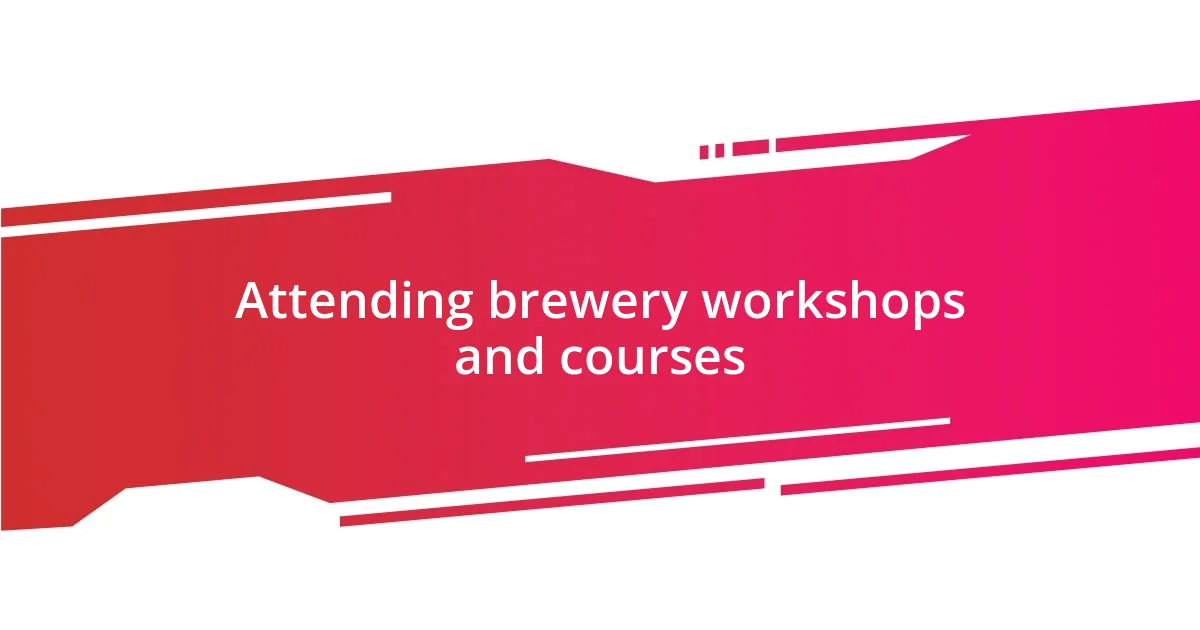
Attending brewery workshops and courses
Attending brewery workshops and courses has truly been an eye-opening journey for me. I vividly recall my first hands-on brewing workshop at a local craft brewery. The excitement in the air was palpable as we gathered around shiny brew kettles, learning the science behind each ingredient. Can you remember a time when you felt that spark of joy while learning something new? It’s a feeling I chase constantly.
One memorable course focused on hop varieties, where I had the chance to smell and taste different hops firsthand. Discovering the range of flavors—citrusy, floral, and even piney—was like tasting the garden of nature itself! I found myself captivated, realizing how the choice of hops could shape a beer’s profile immeasurably. Don’t you think that understanding the nuances of something as simple as a hop can radically transform our appreciation for craft beer?
Moreover, I had the opportunity to participate in a brewing competition during one of the workshops, where I was paired with a seasoned brewer. The mentor-mentee dynamic created an exhilarating atmosphere, where my unrefined ideas were met with encouragement and constructive feedback. It was in that moment, amidst the bubbling tanks and the aroma of malt, that I truly felt like part of a community. I couldn’t help but think: how does collaboration within this passionate circle foster growth and innovation? The answer, I believe, lies in the shared experiences and knowledge that weave us together in our brewing adventure.
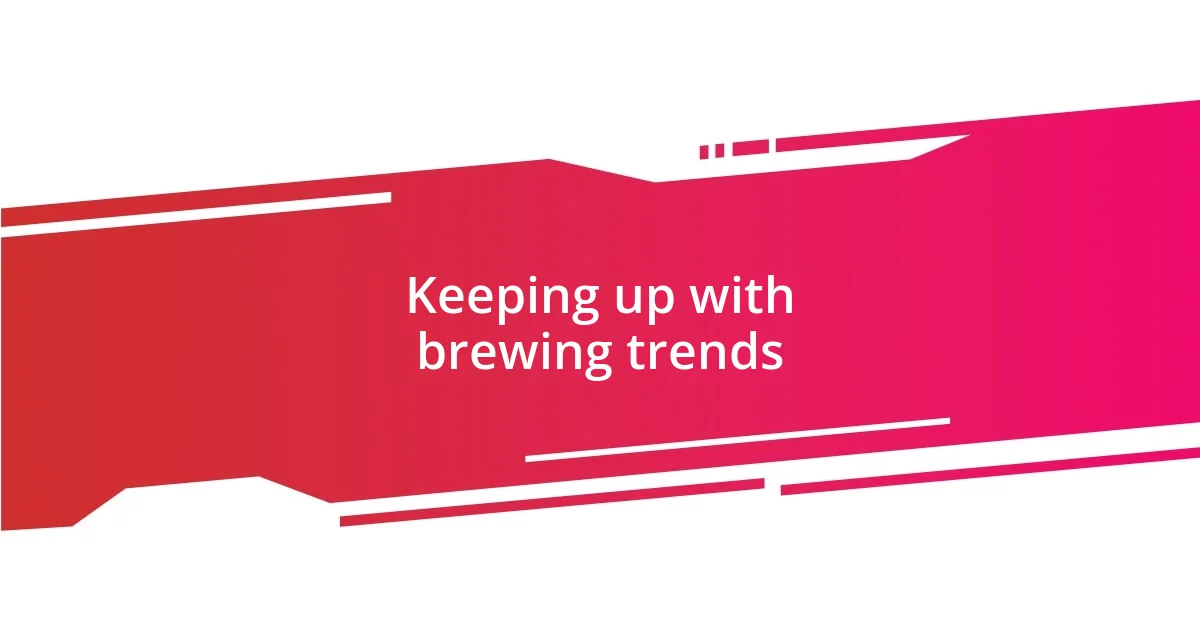
Keeping up with brewing trends
Staying current with brewing trends is essential for any brewer who wants to innovate and connect with their community. I remember when I stumbled upon a podcast featuring rising trends in sour ales; listening to the hosts debate their brewing techniques sparked an idea I had never considered before. Have you ever been inspired by a conversation that changed your creative path? For me, that moment crystallized the importance of diverse voices in brewing.
I also make it a point to follow industry blogs and social media accounts dedicated to craft beer. One day, I came across a video showcasing the art of barrel-aging, which opened my eyes to a whole new dimension of flavors and complexities. It felt like finding a hidden gem in my backyard! Engaging with this content keeps me ahead of the curve, and I often find myself eager to experiment with the latest techniques in my brewery. What trends have you discovered lately that intrigue you?
Moreover, attending craft beer festivals offers a front-row seat to the latest innovations. I distinctly remember tasting an intriguing collaboration brew featuring exotic spices—a flavor profile I never thought would work in a beer. The conversations at these festivals ignite my passion and provide direct insight into what consumers are craving. Isn’t it exciting to be part of a community that constantly evolves and challenges itself? Every interaction and tasting opportunity inspires me to push my own boundaries, reinforcing the idea that staying informed is crucial to both personal growth and the craft itself.


